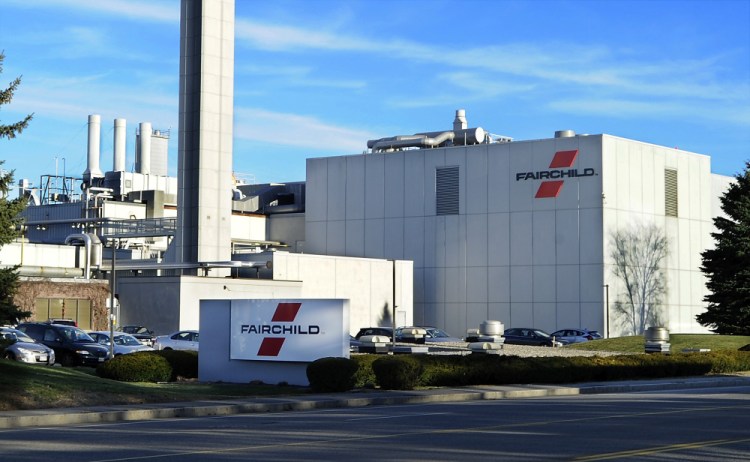NEW YORK — Fairchild Semiconductor International Inc. said a revised takeover proposal from a group led by China Resources Holdings Co. and Hua Capital Management would “reasonably be expected” to lead to a “superior” offer for the company.
The board’s decision opens the door for the two groups to start talking to each other, the U.S. semiconductor company said in a statement Tuesday. Fairchild’s shares jumped 3.6 percent to $21.19 at 10:03 a.m. in New York.
Fairchild operates a chip fabricating plant in South Portland and was headquartered there until 2011 when it moved administrative offices to San Jose. It employs about 650 people in Maine.
Fairchild, which agreed to a merger in November with rival ON Semiconductor Corp. for $20 a share, said last week it received a revised, unsolicited acquisition offer of $21.70 a share in cash from a bidder identified as “Party G” – the same group as the one led by China Resources’ semiconductor arm, a person familiar with the matter said at the time. The revised offer would value the company’s equity at $2.46 billion, compared with the $2.4 billion value of the bid from ON Semiconductor.
If the China Resources-led group and Fairchild reach an agreement, ON Semiconductor could choose to push the bidding higher, according to Christopher Rolland, an analyst at FBR & Co.
“We believe there is a meaningful probability that ON Semiconductor will raise its bid to $22 and perhaps higher,” Rolland wrote in a note to clients on Dec. 30.
On Dec. 14 Fairchild rejected an earlier China Resources bid as not necessarily a “superior proposal” to the merger agreement with Phoenix-based ON Semiconductor. In the revised proposal, Party G offers to pay the $72 million that Fairchild would owe ON Semiconductor as a breakup fee if it canceled the merger agreement, according to the filing. The group also provided a debt commitment letter from JPMorgan Chase & Co.
Kevin Cassidy, an analyst at Stifel Nicolaus, said he doesn’t think it would be good for ON to enter into a bidding war with the Chinese consortium, because ON has limited resources.
“They just spent 15 years working out of debt and they would have to increase their debt again,” said Cassidy, who has a hold recommendation on Fairchild and a buy rating for ON.
Another reason for ON to stay out of the bidding war is that the two companies still have too many products that overlap, he said.
“They don’t get the benefit of owning,” he said.
The battle for Fairchild is the latest example of escalating bids and drawn out fights for semiconductor companies. The industry saw about $110 billion in deals last year as companies combined in the face of rising costs of production and a shrinking customer list. Microsemi was in a monthlong contest with Skyworks Solutions Inc. for PMC-Sierra Inc., which Microsemi ultimately won in November for about $2.5 billion.
China has been trying to create a national champion in semiconductors. The country buys more than half the semiconductors sold each year, and its share is growing. Yet the nation doesn’t have one domestic manufacturer among the 10 biggest chipmakers, a list stacked with U.S. companies.
State-owned China Resources controls the brewer of Snow, the world’s most popular beer brand, as well as the Vanguard grocery chain, power plants and cement production. The conglomerate, led by Chairman Fu Yuning, also owns city gas distributors, manufactures pharmaceuticals and runs banking and asset-management businesses.
Send questions/comments to the editors.



Success. Please wait for the page to reload. If the page does not reload within 5 seconds, please refresh the page.
Enter your email and password to access comments.
Hi, to comment on stories you must . This profile is in addition to your subscription and website login.
Already have a commenting profile? .
Invalid username/password.
Please check your email to confirm and complete your registration.
Only subscribers are eligible to post comments. Please subscribe or login first for digital access. Here’s why.
Use the form below to reset your password. When you've submitted your account email, we will send an email with a reset code.